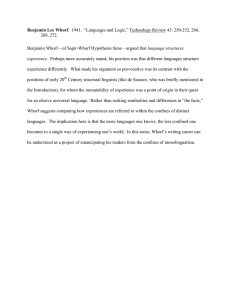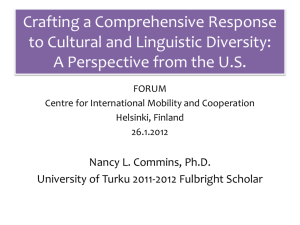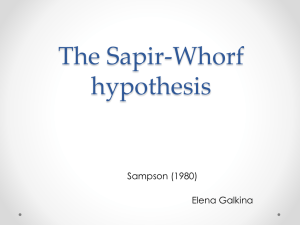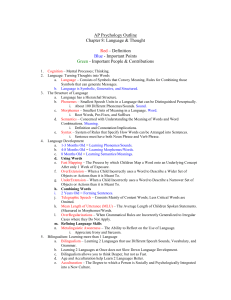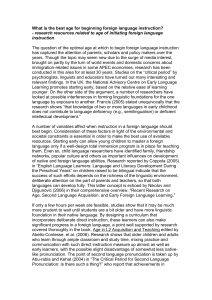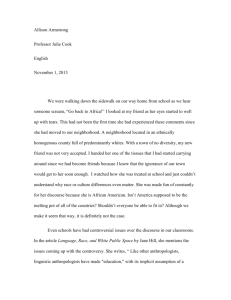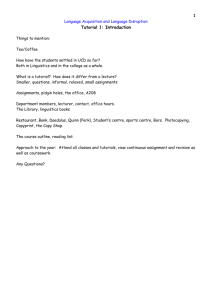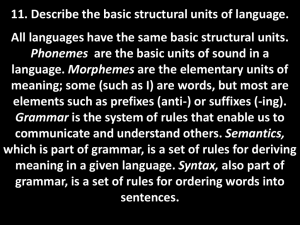Introduction in L2 acquisition
advertisement
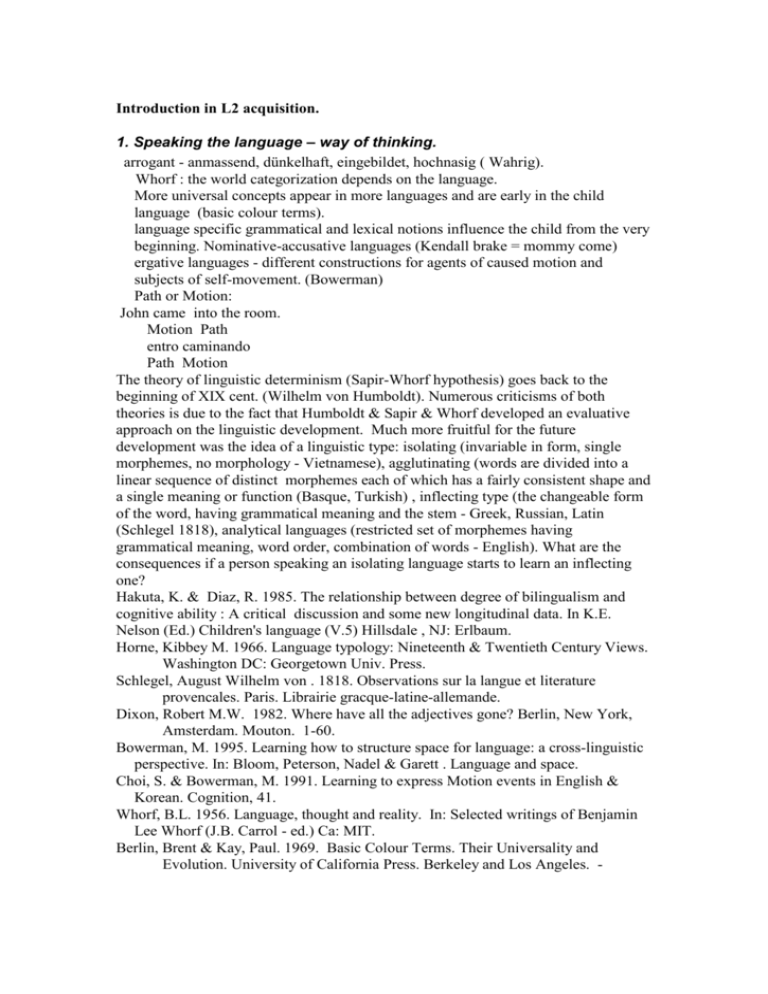
Introduction in L2 acquisition. 1. Speaking the language – way of thinking. arrogant - anmassend, dünkelhaft, eingebildet, hochnasig ( Wahrig). Whorf : the world categorization depends on the language. More universal concepts appear in more languages and are early in the child language (basic colour terms). language specific grammatical and lexical notions influence the child from the very beginning. Nominative-accusative languages (Kendall brake = mommy come) ergative languages - different constructions for agents of caused motion and subjects of self-movement. (Bowerman) Path or Motion: John came into the room. Motion Path entro caminando Path Motion The theory of linguistic determinism (Sapir-Whorf hypothesis) goes back to the beginning of XIX cent. (Wilhelm von Humboldt). Numerous criticisms of both theories is due to the fact that Humboldt & Sapir & Whorf developed an evaluative approach on the linguistic development. Much more fruitful for the future development was the idea of a linguistic type: isolating (invariable in form, single morphemes, no morphology - Vietnamese), agglutinating (words are divided into a linear sequence of distinct morphemes each of which has a fairly consistent shape and a single meaning or function (Basque, Turkish) , inflecting type (the changeable form of the word, having grammatical meaning and the stem - Greek, Russian, Latin (Schlegel 1818), analytical languages (restricted set of morphemes having grammatical meaning, word order, combination of words - English). What are the consequences if a person speaking an isolating language starts to learn an inflecting one? Hakuta, K. & Diaz, R. 1985. The relationship between degree of bilingualism and cognitive ability : A critical discussion and some new longitudinal data. In K.E. Nelson (Ed.) Children's language (V.5) Hillsdale , NJ: Erlbaum. Horne, Kibbey M. 1966. Language typology: Nineteenth & Twentieth Century Views. Washington DC: Georgetown Univ. Press. Schlegel, August Wilhelm von . 1818. Observations sur la langue et literature provencales. Paris. Librairie gracque-latine-allemande. Dixon, Robert M.W. 1982. Where have all the adjectives gone? Berlin, New York, Amsterdam. Mouton. 1-60. Bowerman, M. 1995. Learning how to structure space for language: a cross-linguistic perspective. In: Bloom, Peterson, Nadel & Garett . Language and space. Choi, S. & Bowerman, M. 1991. Learning to express Motion events in English & Korean. Cognition, 41. Whorf, B.L. 1956. Language, thought and reality. In: Selected writings of Benjamin Lee Whorf (J.B. Carrol - ed.) Ca: MIT. Berlin, Brent & Kay, Paul. 1969. Basic Colour Terms. Their Universality and Evolution. University of California Press. Berkeley and Los Angeles. - 2. Linguistic politics. Natural and educated bilinguals. Bilingualism and second language acquisition. Bilingualism is more natural than monolingualism. Countries with more than one official language - concurrence of languages, state linguistic politics. SLA in submersion settings ( one learner surrounded by native speakers - informal learning) and in immersion settings ( a group of learners taught through the medium of the second language - formal learning). State politics may result in the fact that the native speakers of rare and non-popular native languages forget them . Levels of mastering the language. Tests. 3. Foreign Language teaching. Object - grown-up person in a classroom. Grammar- translation methods vs. direct methods. Description of interferention and typical mistakes. Motivations: financial, prestige(instrumental motivation), culture, not to differ from the surrounding (integrative motivation). Bilingualism: Language and Cognition. 1998. ED. by Fr. Grosjean, Jud. Kroll Ju. Meisel & Peter Muysken. Cambridge :CUP. Klein W. 1986. Second language acquisition. Cambridge, CUP. Thomas 1989. The acquisition of English articles by first and second language learners. 4. Child language researchers. Child in a natural surrounding. Errors are sign of progress. Simple recapitulation or another process ? Erwin-Tripp. 1974. Is Is second language learning like the first? TESOL Quarterly 8.

